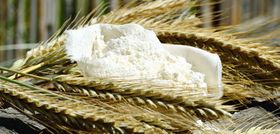Aleuromancy
From Kook Science
Aleuromancy (from the Greek: αλευρον, aleuron ["flour"] + μαντεία, manteia ["divination, soothsaying"]) is a method of divination conducted by use of wheat flour, including as a sortilege of balls of flour dough containing inside slips of paper with fortunes written on them. Lewis Spence in his Encyclopædia of Occultism (1920), p. 13, relates that such dough balls "were thoroughly mixed up nine times, and divided amongst the curious, who were waiting to learn their fate. Apollo, who was supposed to preside over this form of divination, was surnamed Aleuromantis."
The modern use of fortune cookies may be seen as a continuation of the aleuromantic method, though they do not share a direct lineage, the fortune cookie being, according to some theories, likely to have been based on the Japanese tsujiura kashi (辻占菓子, "tsuji fortune-telling pastry"), specifically tsujiura senbei (辻占煎餅, "tsuji fortune-telling rice crackers").
